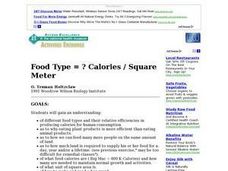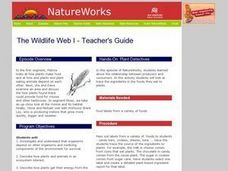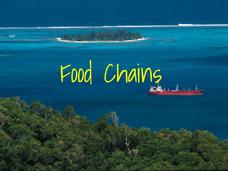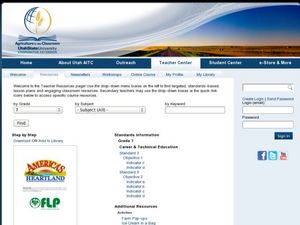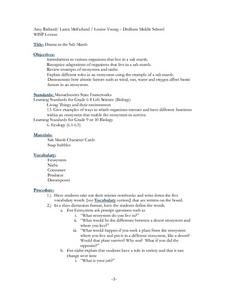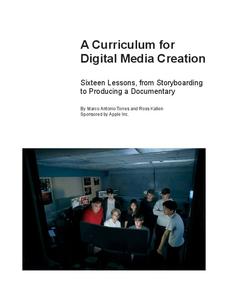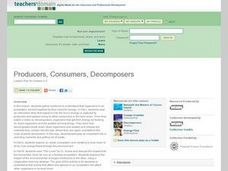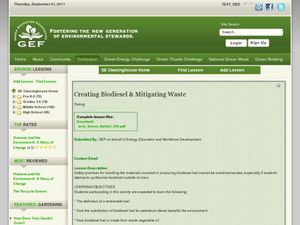Curated OER
Economics: People as Producers and Consumers
Students examine the dual roles of producers and consumers in people by creating fictional stories that include examples of both. Their stories include descriptions of the tools and skills needed for the jobs of their characters and...
Curated OER
Ecology: The Food Web
In this ecology worksheet, students match the vocabulary to the definitions, then represent producers and consumers by drawing a Pyramid of Numbers.
Curated OER
Label Language
Fourth graders explore food labels. In this consumer education lesson, 4th graders describe and evaluate various components of familiar food labels. Students discuss which traits make a product appealing to consumers. Students complete a...
Curated OER
Food Type And Calories Per Square Meter
Students compare the efficiency of producing food calories in different types of food then calculate how much land is required to supply their food for a year. They then graph the results.
Curated OER
The Wildlife Web I
Students explore the relationship between producers and consumers. In this activity, they trace the ingredients in the foods they eat to plants. Supplement to Natureworks episode from New Hampshire Public Television, but activities may...
Curated OER
Globalization and Consumerism
Is the expansion of American corporations abroad a good or bad thing? After examining the global operations of Ford Motor Company, McDonald's, and Walmart, class members are asked to evaluate the impact of globalization and consumerism.
Ask a Biologist
It’s a Plankton Eat Plankton World
For as small as they are, plankton sure play an enormous role in maintaining marine ecosystems. Dive into an investigation of these tiny organisms with a hands-on life science activity in which children cut out pictures of sea animals...
National Park Service
Living & Non-Living Interactions
What better way to learn about ecosystems than by getting outside and observing them first hand? Accompanying a field trip to a local park or outdoor space, this series of collaborative activities engages children in learning about the...
Curated OER
Food Chains
Have your class discuss food chains using this presentation. This resource goes through a step by step exploration of plants and the food chain. It talks about the energy of the sun, producers and consumers, herbivores and carnivores,...
Curated OER
Give it Back from a Snack
Young scholars conduct and analyze a survey about snacks. In this graphing lesson, students ascertain which snacks would be the best choice for the community. Young scholars hold a sale and decide how the money could best be spent for...
Curated OER
Sample Midyear Examination (Chemistry and Biology)
A 12-page midterm exam sample can be given to young scientists in preparation for an exam. This particular installment is geared toward a class that delves into both ecology and chemistry concepts. There is no way to separate the 50...
Media Education Lab
The Ethics of Propaganda
What are the short and long-term consequences for consumers and producers of modern media propaganda? Class members ponder this essential question as their unit study of ethics of propaganda concludes. After examining two case studies,...
Captain Planet Foundation
Energy Flow in the Garden
How can you tell what an owl has eaten? Study the food chain and flow of energy in an ecosystem by dissecting an owl pellet and noting the bones found inside. Additionally, the lesson includes a game about consumers and producers with a...
Curated OER
Dinner in a Woodland
After reading a short paragraph about what makes up a woodland habitat, fifth graders attempt to identify the primary consumers, secondary consumers, and third order consumers in two separate food chain scenarios. They also name a hawk's...
Curated OER
America's Heartland: Step-By-Step Lesson Guide
An excellent resource gets kids looking at agricultural production to better understand the careers needed in distributing foods from the farm to the consumer. Book, poster, web, and video links are included for teacher use. There is...
Curated OER
Water Works
Students create a "water web" to illustrate the interdependence among water users and producers. They distinguish between direct and indirect uses of water; illustrate the interconnectedness of water users in a community; and demonstrate...
Curated OER
Drama in the Salt Marsh
Students are introduced to the various organisms that live in a salt marsh. They recognize adaptations of organisms that live in the salt marsh. Pupils review concepts of the ecosystem and niche. Students explain the different roles...
Curated OER
Ecosystem Interactions in Refuges
Seventh graders, using national parks as models, illustrate the energy flow in ecosystems. Working in groups, they use murals, flow charts, or other visual displays to record their findings. Students represent the food chains and webs...
Howard Hughes Medical Institute
The Making of the Fittest: Got Lactase? The Co-evolution of Genes and Culture
Got milk? Only two cultures have had it long enough to develop the tolerance of lactose as an adult. Learn how the responsible genes evolved along with the cultures that have been consuming milk. This rich film is supplied with a few...
Apple
A Curriculum for Digital Media Creation
Consumer technology has made it possible for filmmakers to create entire movies from the comfort of their home computer. Guide high school film buffs through the process of designing a documentary with an extensive unit published by...
Curated OER
Producers, Consumers, Decomposers (3-5)
Students gather evidence to explain that organisms in an ecosystem are tied together by their need for energy. They see that decomposers break down dead organisms and wastes and release the nutrients they contain into the soil,
Curated OER
Creating Biodiesel and Mitigating Waste
Biotechnology pros produce their own biofuel using waste oil and fresh vegetable oil. They test the quality of their product using titration techniques and pH analysis. They write their observations and report their findings. Be aware...
Media Smarts
Bias in News Sources
As young consumers of media, it is important for high schoolers to explore concepts of bias and prejudice, and how they may be present in media. After discussing ideological messages that media can contain, individuals complete a warm-up...
Curated OER
Fighting Fake News
Fake news. Alternative facts. Internet trolls. In an age of Newspeak, it's increasingly important to equip 21st century learners with the skills needed to determine the legitimacy of claims put forth on social media, in print, and in...
Other popular searches
- Producers and Consumers
- Producers an Consumers
- Producers Consumers
- Science Producers Consumers
- Producers and Consumers Poem
- Marine Producers Consumers
- Producers Consumers Writing
- Producers, Consumers





